What is call center coaching?
Call center coaching refers to the process of supervisors and experienced agents providing feedback, guidance and ongoing support to call center agents in one-on-one or group sessions. Its primary aim is to improve agent performance and enhance customer service quality.
Unlike training, which equips agents with the requisite skills and knowledge against a set benchmark, call center coaching is an ongoing, behavior-driven endeavor, overseen by supervisors and call center managers. The objective of call center coaching is to make agents realize their latent potential and cultivate sustained improvement.
Understanding call center coaching: Purpose and distinction
As call center coaching is often unfairly treated as a subset of call center agent training, it makes sense to clear the purpose, differences and misconceptions before we delve into the techniques.
Purpose of call center coaching
Call center coaching extends beyond immediate problem-solving and performance targets; it requires nurturing your agent and tapping into their inherent potential to perform at their best.
While its primary role is to aid your call center agents in delivering exceptional customer experiences, coaching refines call center agent skills such as active listening, customer empathy and emotional intelligence. It's evident that these crucial abilities can only be honed by your call center manager.
Cultivating a culture of coaching is essential, as it leads to higher employee engagement, subsequently resulting in reduced turnover rates and a more stable, experienced workforce.
Differences between call center training and coaching
Call center training imparts knowledge and skills to agents, whether it's for tasks they're new to or to adapt their skills in different scenarios. Coaching, conversely, is provided to agents who already possess the knowledge and skills but require guidance in fully leveraging them.
Furthermore, there are numerous distinctions between coaching and training. Let's delve into them.
Aspect | Call center training | Call center coaching |
Objective | Acquiring skills and knowledge | Developing competency for continuous performance improvement |
Nature | Calendarized, classroom-based | Ongoing, on-the-job, behavior-driven |
Duration | Varies. Typically takes place during onboarding, or when new product update releases | Continuous. Integrates into the daily workflow to overcome daily operational challenges |
Host | External trainers or designated training personnel | Call center supervisors or tenured agents with exceptional track records |
Method | Workshops, e-learning, simulations | One-on-one sessions, feedback, role-playing |
Content | Standardized, protocol-based | Tailored to individual needs and challenges |
Feedback | Shared in a group setting | Personalized and ongoing |
Evaluation | Quizzes, assessment | Customer feedback, interaction quality |
Adaptability | Less flexible | Highly adaptable, addresses current challenges and needs |
Benefits of call center coaching
In an era where advanced call center technologies are readily available, if you're still pondering the quality of your customer service standards, it may be an indication that your agents are emphasizing the value of coaching over a proliferation of tools.
As you contemplate this, let’s look at the advantages of investing in call center coaching.
Enhanced customer satisfaction
Imagine a financial institution's call center where a well-versed and thoroughly coached agent goes beyond providing balanced information. They seize the opportunity to educate customers about an optimized savings plan tailored to their financial goals.
Through call center coaching, your agents can acquire the skills to turn interactions into memorable experiences. They learn to listen actively, respond empathetically and tailor solutions to individual needs. This level of personalized service leaves a lasting impact on your customers, driving customer satisfaction, loyalty and advocacy.
Learn more: How to show empathy in customer service
Improved agent performance
Agents regularly coached and supported are better equipped to handle customer calls effectively and efficiently. Here's how.
Reduced call handling times: Well-coached agents can quickly resolve customer issues. This can free agents to handle more calls, which means less call abandonment rate, lower average hold time and increased customer satisfaction.
Positive impact on service standards: Well-coached agents exhibit a remarkable ability to meet SLAs efficiently. This proficiency results in fewer escalations, leading to positive agent morale and high productivity. Such adept handling of tasks proves invaluable in navigating an emotionally taxing call center environment, demonstrating how effective coaching not only enhances operational efficiency but also positively contributes to the overall well-being of the team.
📋Scenario:
If you notice that one of your agent's responses may not have fully addressed a customer's query, you might approach it by saying,
'Let's review the customer's question and your response. Can you think of an alternative approach you could have taken?'
The discussion is not ideal to have in a group setting. However, given its critical business significance, you should schedule a quick one-on-one chat with the agent, helping them realize the best possible response for the situation.
Improved employee engagement
Through call center coaching, you can provide agents with individualized attention, addressing their unique strengths and areas for improvement. This personalized approach signals to agents that their growth and success are valued by you, increasing their sense of worth and commitment to you.
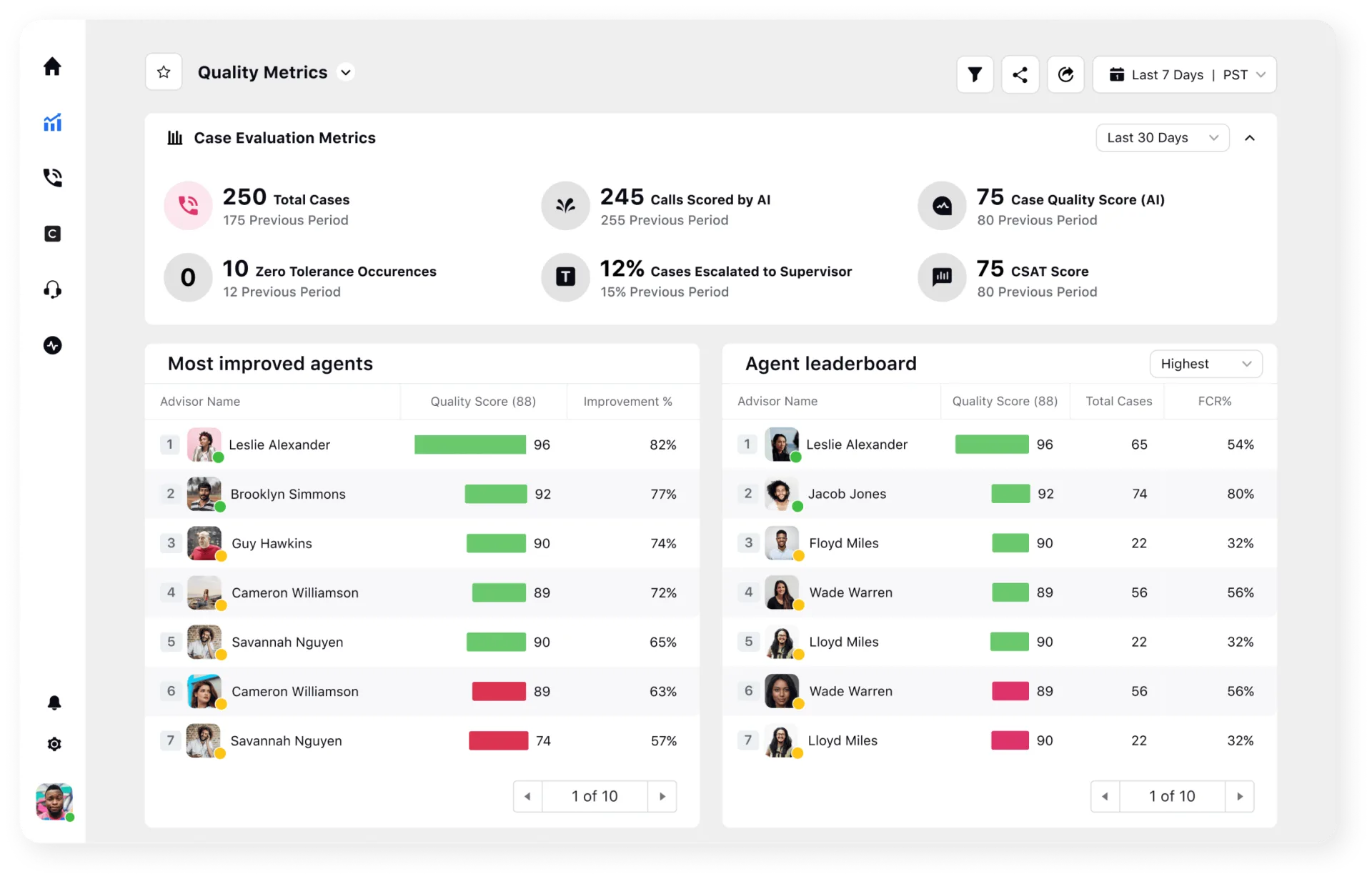
Effective call center coaching also facilitates open communication between your agents and supervisors. Your agents feel heard, understood and valued, leading to a stronger sense of belonging and trust within the team.
Enhanced retention rates
High agent turnover is a significant concern in call centers. Call center coaching helps agents develop a diverse set of skills beyond the technical aspects of their role. This investment in skill-building demonstrates your commitment to your agents’ professional growth, which in turn leads to higher job satisfaction and retention rates.
Furthermore, by pairing your experienced and newer agents in a call center coaching program, you can provide the newer agents with valuable mentorship and support, while also allowing your experienced agents to develop their leadership skills further. This way, your agents understand their role in achieving broader business goals, fostering a sense of purpose and contributing to a shared vision.
Must read: The call center guide to agent retention
Principles of effective call center coaching
Effective call center coaching is based on four key principles. The principles ensure that call center coaching as part of the daily call center workflow remains continuous, productive and tangible.
1. Active listening
Active listening transcends the mere act of hearing; it entails a profound understanding of your agents' experiences and challenges. As a coach, it is imperative to engage in open, empathetic dialogues with your agents, creating a secure environment for them to voice their concerns and needs. By comprehending your agents' perspectives, you can customize your guidance and provide the necessary support. This practice not only cultivates trust but also underscores the value placed on your agents, subsequently elevating their morale and motivation.
Also read: 10 customer service coaching tips to supercharge your agents
2. Provide feedback and recognition
Feedback helps agents to identify their strengths and weaknesses and track their progress over time. Similarly, try accompanying positive feedback with some recognition, which will make agents feel valued, appreciated and motivate them to continue to improve.
Example:
A call center agent may be struggling to meet their First Contact Resolution (FCR) goal. Their coach may listen to some of their calls and identify areas where they can improve, such as their questioning skills or their ability to close sales. The coach can then provide the agent with specific feedback on how to improve in these areas.
However, feedback as a call center intervention has been largely underutilized owing to its misinterpretation. Here’s how feedback can actually work.
Be specific: When providing feedback, be as specific as possible. Avoid general statements such as "good job" or "needs improvement." Instead, focus on specific areas of the agent's performance, such as their questioning skills or their ability to continue an empathetic conversation with an irate customer.
Be timely: It's crucial to deliver feedback promptly following your agent's performance. This immediacy aids agents in retaining the feedback and applying it effectively to their subsequent calls.
Be constructive: When providing feedback, focus on the agent's strengths and areas for improvement. Avoid being overly critical or negative.
💡Pro tip: Sprinklr Service's Quality Management software offers AI scoring that helps with an objective assessment of each agent's performance at the conversation level.
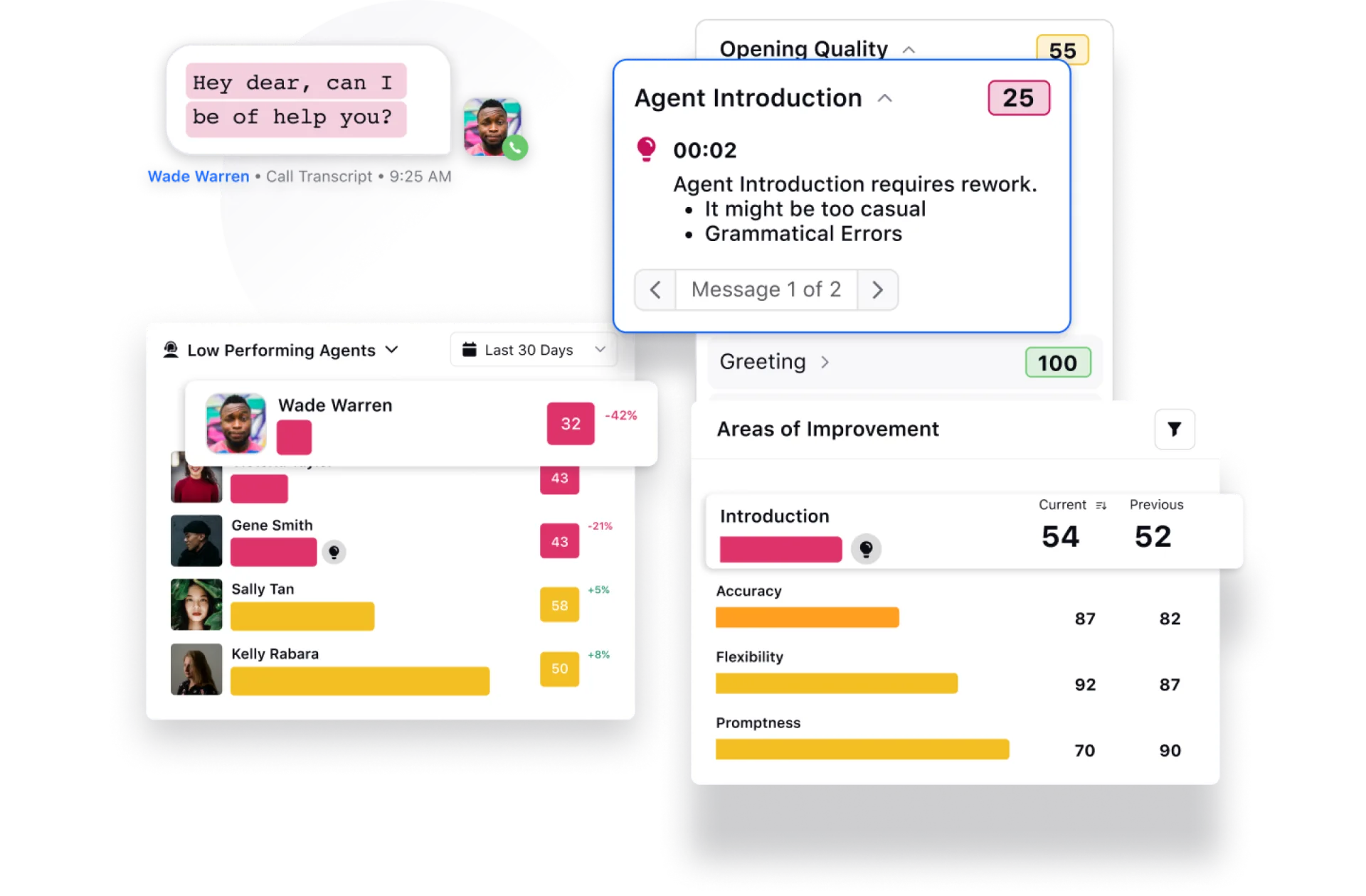
3. Keep it individualized
Every agent is different, so call center coaching sessions should be tailored to the individual agent's needs and learning style. It would help if you took the time to understand each agent's strengths and weaknesses and develop coaching plans to help them improve.
Example: An agent may be struggling with customer complaints. You could review some of their calls with them to identify areas where they could improve, such as listening actively, apologizing sincerely and offering solutions. You could also develop a coaching plan with role-playing exercises and practice calls to help the agent improve their skills.
💡Pro tip: Today, there are advanced quality management solutions that integrate seamlessly with your Learning Management System (LMS), suggesting training and development courses for your agents based on their performance metrics. For example, suppose an agent has received low CSAT scores for a specific skill. In that case, the software can recommend the relevant course from your LMS to upskill the agent.
Learn more: How learning management system works
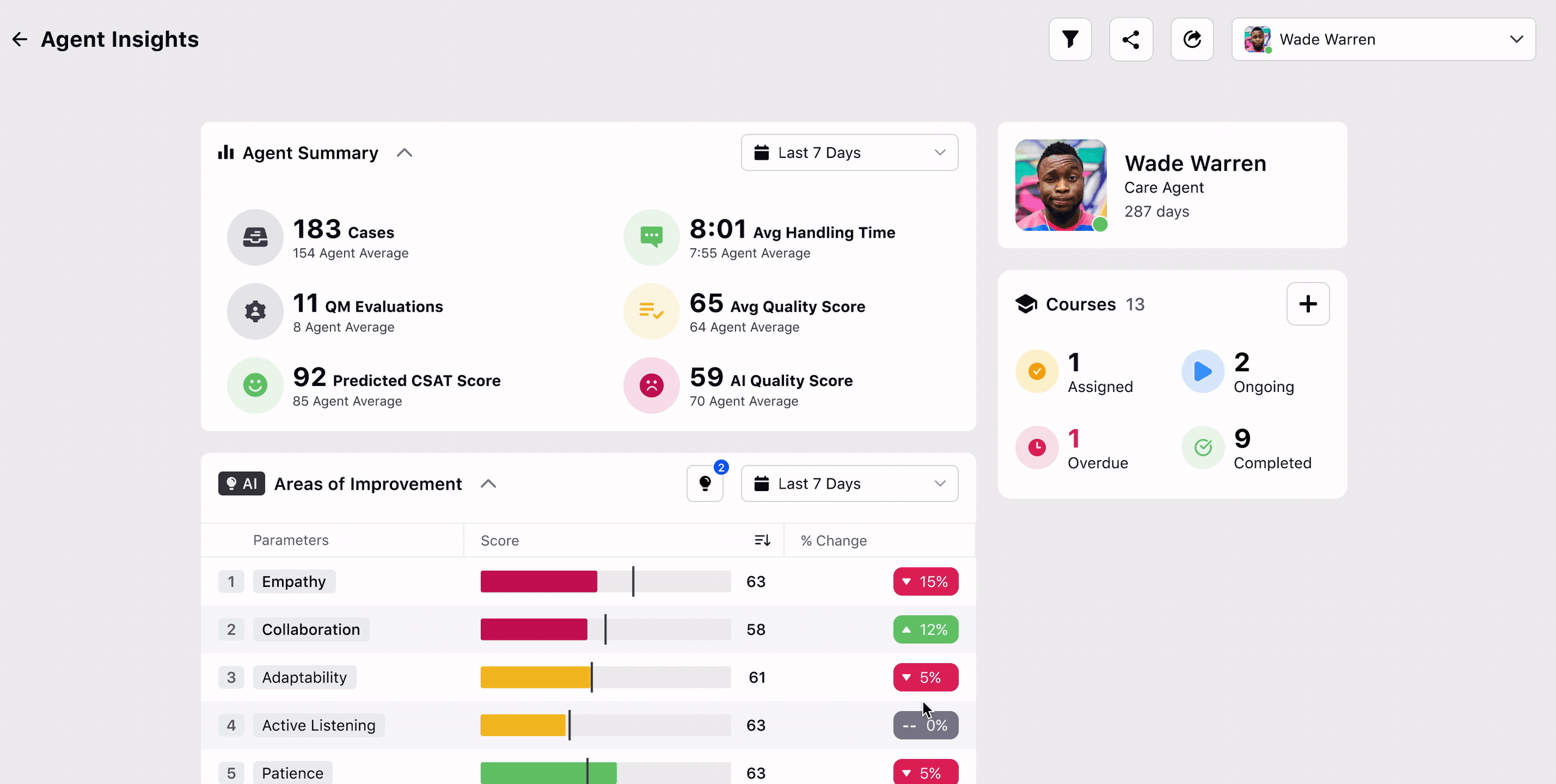
4. Be focused on goals
As a call center coach, you can work with your agents to establish SMART (Specific, Measurable, Achievable, Relevant, Time-bound) goals. These goals should align with both individual development and organizational objectives. Goal setting provides clarity, motivation and a sense of direction for your agents, helping them track their progress and celebrate milestones.
Effective techniques for call center coaching
Call centers operate in unique environments specific to their business needs. Also, agents have distinct skills and responsibilities that gradually evolve with time. So, there is no one-size-fits-all call center coaching technique.
Let’s take you through some call center coaching techniques widely used by businesses currently.
1. One-on-one coaching sessions
One-on-one coaching provides a private and confidential space for your agents to discuss challenges candidly, seek advice and express concerns. This level of trust and confidentiality promotes open communication, allowing your agents to be more receptive to feedback and guidance. Moreover, the immediate and direct interaction in one-on-one coaching sessions ensures that feedback is timely and actionable. Agents can readily apply the insights gained to their subsequent interactions with customers, leading to tangible and rapid improvements in performance.
2. Role-playing scenarios
Role-playing allows your agents to put theoretical knowledge into practice in a controlled environment. They can experiment with different approaches and techniques, helping to solidify their understanding and confidence.
By acting out various customer service scenarios, agents gain a realistic perspective on the challenges they may encounter. This helps them prepare for a wide range of situations they may face in actual customer interactions.
3. Call analysis and feedback
Through call analysis, supervisors can objectively assess agent performance based on specific criteria such as script adherence, resolution effectiveness, emotion control and more. This data-driven approach ensures objectivity and consistency in evaluations.
Feedback derived from call analysis can be specific, actionable and constructive. It helps agents understand what needs improvement and provides guidance on how to enhance their performance.
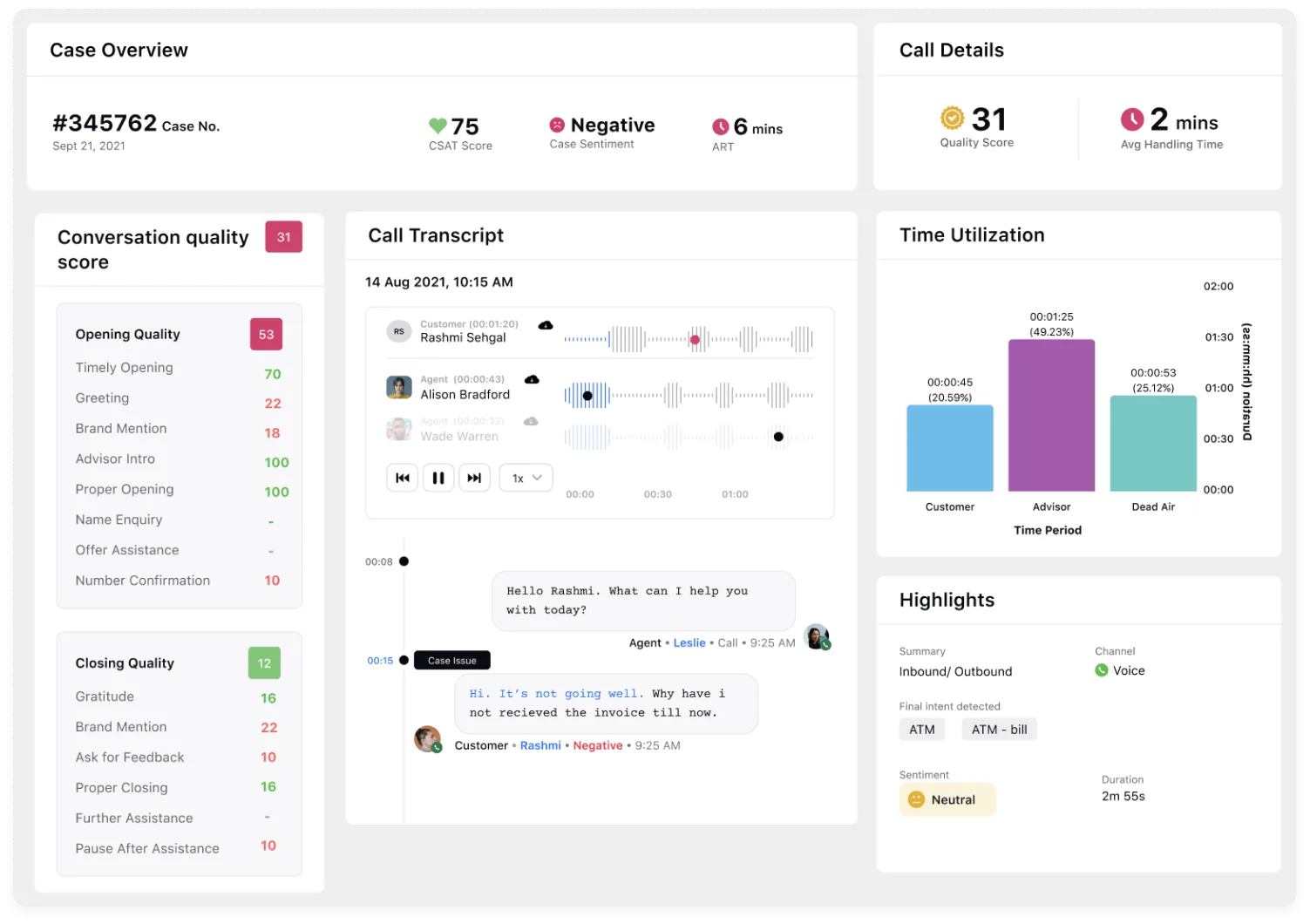
4. Customized coaching plans
To create a customized coaching plan, the coach should first meet with your agent to assess their needs. Performance reviews, customer surveys, call reports and one-on-one conversations are key methods to identify coaching needs.
The coaching plan should include specific goals, activities and resources.
The goals should be SMART (specific, measurable, achievable, relevant and time-bound).
The activities should be designed to help the agent achieve their goals.
You must ensure resources should be available to the agent to complete the activities.
Example: Customized coaching plan for a call center agent struggling with intro, greeting and handoffs.
Goal: Elevate first impressions and seamless transitions for personalized customer service.
Activities:
Conduct targeted role-play sessions with the coach to refine introductory interactions, greetings and handoff procedures.
Analyze and dissect recordings of customer calls, emphasizing the effectiveness of introductions, greetings and transitions.
Resources:
Tailored training materials and scripts for crafting impactful introductions, warm greetings, and smooth handoffs.
In-depth feedback from the coach, providing specific insights and actionable recommendations.
Access to model call recordings showcasing exemplary handling of introductions, greetings, and handoffs.
The coach would meet with the agent regularly to review their progress and tailor the coaching plan as needed.
5. Emotional intelligence coaching
Emotional intelligence is the ability to understand and manage one's own emotions, as well as the emotions of others. Furthermore, the coaching process should include practical techniques for managing agents’ emotions in a constructive manner. Activities such as relaxation techniques and call center stress management strategies like guided imagery, box breathing and listening to curated playlists, can promote relaxation among agents, leading to increased efficiency at work.
6. Team coaching and collaboration
While one-on-one coaching is crucial, team coaching fosters collaboration and knowledge sharing. It encourages your agents to learn from their peers, share best practices and collectively tackle challenges. Getting all agents to participate and make the session interactive can be challenging. This can be done by asking open-ended questions and allowing each agent to share their ideas.
7. Time management and prioritization training
Time management in a call center context involves allocating time to various tasks effectively, ensuring that each call is handled promptly without compromising service quality. This includes managing call durations, administrative tasks and after-call work within a designated time frame. Though it looks straightforward on paper, these are often the most challenging parts, especially in a call center that experiences hundreds of calls daily.
In time management and prioritization training, agents are coached on identifying and prioritizing calls based on urgency and complexity. Moreover, you must teach the hacks (if any) to efficiently complete post-call tasks to minimize downtime between calls.
These sessions also are a great platform to teach agents how to use call center software and knowledge resources effectively. For example, you can demonstrate how to quickly access product information, knowledge base or FAQs to provide timely and accurate responses to customers.
💡Pro tip: With growing customer calls, you may want to check out agent assist software, which automates routine tasks (like call summarization, disposition etc.) for your agents. It also provides AI-powered assistance in the form of canned responses that can be delivered in one click.
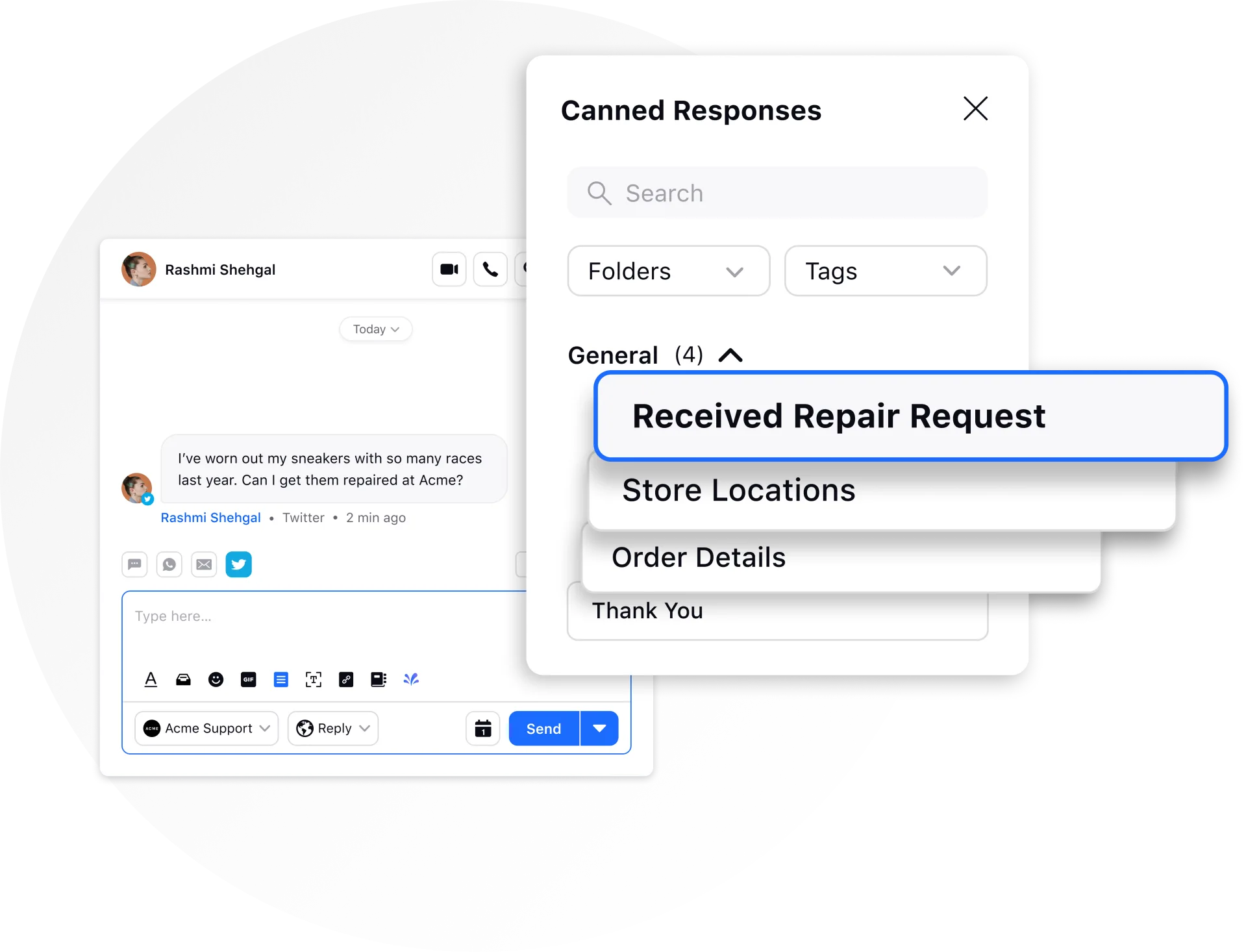
Ace call center coaching with expert insights
Were there opportunities for improvement in how my agent handled that interaction?
Could there have been a proactive step taken earlier in that call that might have prevented the escalation?
Were there moments where expressing empathy could have further diffused the situation?
If these contemplations resonate with you, then call center coaching emerges as the imperative solution.
As you convene to deliberate on the integration of call center coaching as a transformative intervention in your call center, we offer you an insightful, downloadable eBook. Learn from the esteemed customers of Sprinklr Service who have mastered call center coaching. Thank us later 😊
Frequently Asked Questions
Yes, call center coaching can be just as effective for remote or virtual teams. Virtual coaching sessions, screen-sharing technology and cloud-based call monitoring tools make it possible to provide guidance and support to remote agents. The principles of active listening, feedback and goal setting remain essential for remote coaching success.
related products
Thank you for contacting us.
A Sprinklr representative will be in touch with you shortly.
Contact us today, and we'll create a customized proposal that addresses your unique business needs.
Request a Demo
Welcome Back,
No need to fill out any forms — you're all set.



